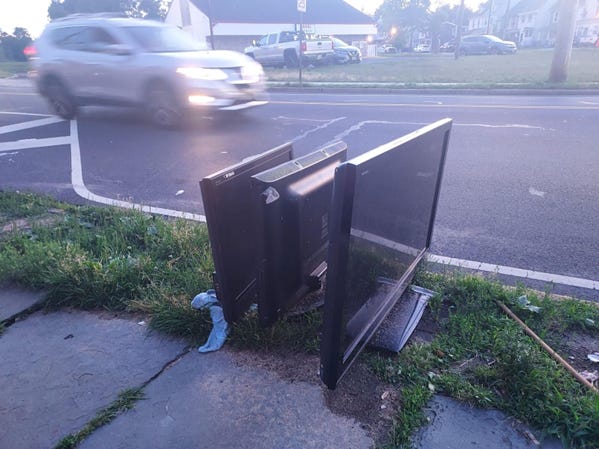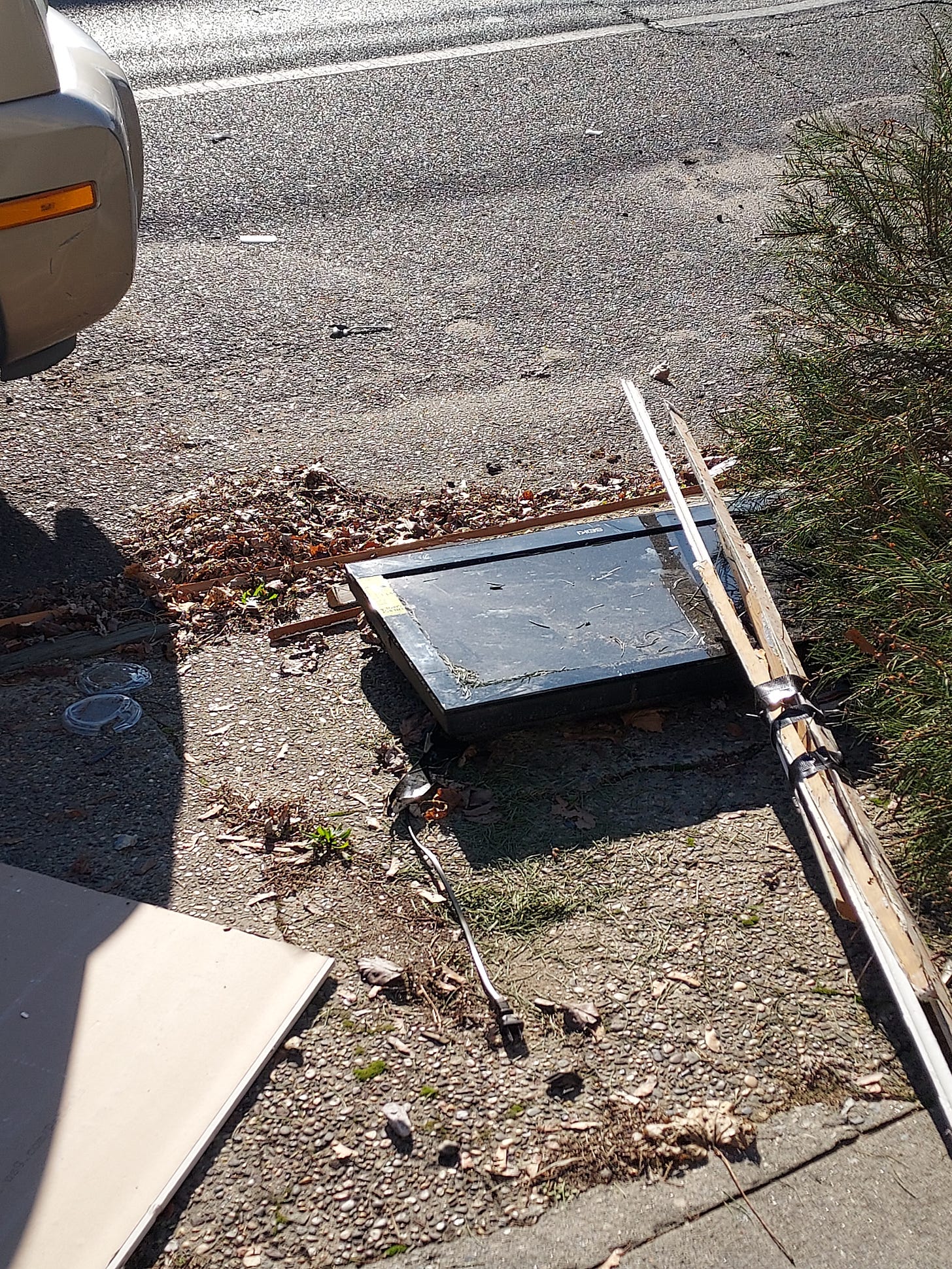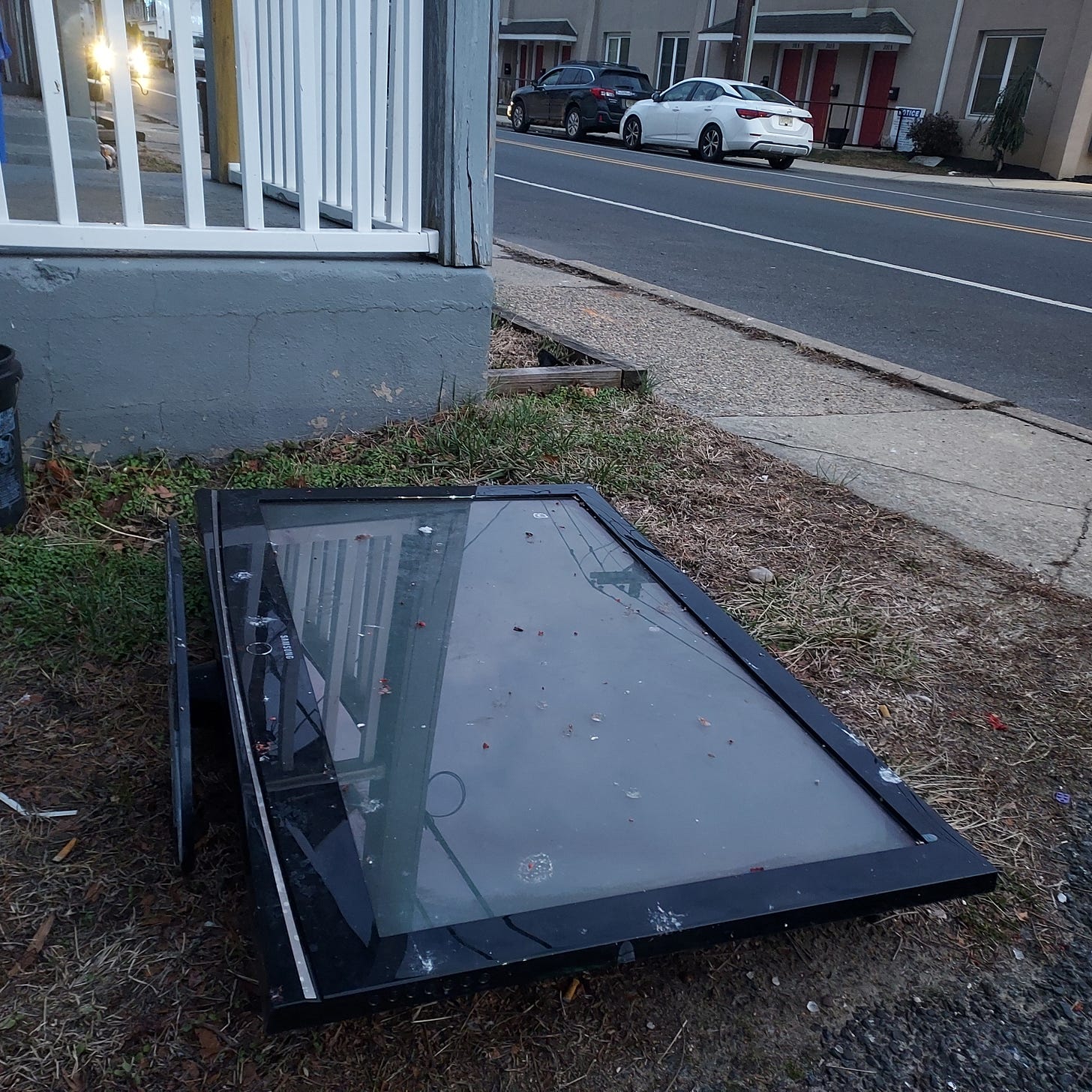TOSSING A TV TO THE CURB FOR PICK UP?
THATS NOT GOING TO WORK IN MOUNT HOLLY
By Rebecca Nieves, Special to The Reporter from The College of New Jersey.
Of Burlington County’s 40 municipalities, there are 24 towns that have electronic waste [e-wastes] collection programs. And Mount Holly is not among the towns that collect e-wastes.
New Jersey passed the Electronic Waste Management Act [ EWMA ] in 2007 as a way to contain the toxic substances found inside electronics. The substances are safe while the devices are intact, but once they are crushed, toxins contained inside escape into the environment where they eventually find their way into soil, water, food and us.
The EWMA mandated that all townships “adopt an ordinance which requires” residents … to “source separate [e-wastes] from the municipal solid waste stream.” This was accomplished in Mount Holly by section 137 of our ordinances. And while the 24 towns noted above found a way to save the recycling transport chore for their residents, Mount Holly tells residents to transport their wastes to Good Will or the Burlington County Landfill for disposal. While the trip is time consuming and burns some gas, visitors to the landfill facility can rejoice in the fact that the drop off is free to Burlington County residents. Local businesses with fewer than 50 full-time employees can also recycle these items with no charge.
What Are E-Wastes and Why Do They Matter?
E-wastes are electronic devices and their components that are no longer wanted or usable such as cell phones, powercords, computers, and televisions. These wastes often include heavy metals, PCBs, and other toxic substances that can cause illness and pollute our soil, streams and groundwater.
To be disposed of properly, these electronics need to be brought to one of the several recycling centers within Burlington County.
According to a study published in the Journal of Environmental Technology & Innovation, toxins from some of the most popular electronics (batteries, TVs, wires, and computer boards) cause a variety of adverse health effects such as cancer, memory loss, skin irritations, damage to internal organs, and developmental delays.
Toxins can also be carried by rain into local rivers or through airborne particles that are released into the air and settle into nearby homes, playgrounds, or water sources. Many of these toxins, such as metals, do not degrade and can remain in the environment for a long period of time, increasing the risk of exposure.
Some may assume toxic waste management is an issue at distant industrial sites. But the legacy of our disposable economy is scattered throughout suburban New Jersey in the form of landfills and other polluted sites. The consequences of poor waste practices exists right here in Mount Holly with our very own “superfund” landfill site. In 1983, the Landfill & Development Company site in Mount Holly was added to the EPA’s National Priorities List. The site operated as a landfill in the ‘80s, accepting commercial waste. After its closure in 1986, testing revealed contamination of the groundwater with heavy metals and volatile chemicals. Clean-up efforts, which began in 2007, can take decades and come with high costs, involving treatment of polluted groundwater and removal of contaminated soil; the site continues to be monitored today.
And that’s why proper disposal of hazardous materials, such as electronics, is important for the environment and public health.
PUBLIC POLICY OUTCOMES ON E-WASTE MANAGEMENT
Because E-wastes are not collected by the Township, once they are placed at the curb, they tend to linger on our streets for weeks. This not only represents a health threat but also produces a visual nuisance that many residents, like Johannus Franken, find objectionable.
Mr. Franken works as an environmental specialist with the NJDEP and was a former member of the Mount Holly Environmental Advisory Committee.
“I have definitely seen people who have two or three flat screen TVs behind their shed or in the little alleyway between their house and their neighbor”
said Franken in an interview. The environmentalist added that this behavior was likely due to a lack of awareness about proper disposal methods, leaving residents unsure of where to take their e-waste.
Franken stated that community events could be a game-changer in educating residents how to recycle properly, and that providing them is an efficient way to get rid of wastes for which residents may be uncertain. Past events hosted by the local environmental committee, Franken said, proved successful.
“We organized a whole morning where people were pulling up and dropping off electronics,” Franken said, “I think starting with the local knowledge, and then getting an event going, you could really generate momentum.”
Nick Sodano, a former Councilman, NJDEP employee and former member of the Mount Holly Environmental Advisory Committee stated that Mount Holly could easily accomplish a collection program if it summoned the will to organize one.
“Our Public Works employees scout the town all week on the lookout for bagged vegetation. They could fit pickups of monitors or laptops into their daily routine of brush pickups and not miss a beat. The residents who leave these things at the curb are not producing an overwhelming number of devices and it would probably take a couple of months to gather enough pieces to warrant a trip to the landfill in Florence.”
While townships debate whether they have enough personnel resources to operate an e-waste collection program, the state has already dealt with the fiscal resources needed to actually accomplish disposal. The Electronic Waste Management Act [ EWMA ] states that “A manufacturer shall collect, transport, and recycle all types and brands of covered electronic devices, including orphan devices.” The law makes the industry pay for disposal. These costs get built into the upfront costs consumers pay, but the convenience of not having to pay for disposal at the end of the device lifespan is good public policy.
The state also created a licensing program for commercial recycling facilities. Mr. Sodano met in 2021 with Magnum-LLC which is a company that operates a Class D recycling facility out of Pennsauken. They collect “COVERED ELECTRONIC DEVICES” [CEDs] from businesses/municipalities and disassemble the devices to get paid by the device manufacturers from a fund set up by the EWMA.
OTHER CONSIDERATIONS WHEN DISPOSING OF YOUR “COVERED ELECTRONIC DEVICE”
The Burlington County Resource Recovery Complex, located in Florence about 15 minutes away from Mount Holly, accepts most electronic waste, from game consoles to radios. The full list of what they accept can be found on the Burlington County website. Electronic retailers also allow customers to drop off their old electronics when purchasing a new computer, recycling the outdated devices.
Residents who cannot lift or transport their e-waste themselves, especially seniors or individuals with disabilities, can arrange for pick-up services with local non-profits like Goodwill or the Salvation Army.
Recycling centers ask that residents remove any personal data on the device before drop-off as a safeguard against potential data breaches. Discarded electronics can still contain sensitive information such as banking details, personal photos, passwords, or business records. Erasing data before disposal helps protect privacy and prevents the risk of identity theft or fraud from occurring.
Following the disposal protocols of your chosen recycling center ensures that your personal information is securely handled and that your e-waste is processed in an environmentally friendly way.
As noted by Mr. Franken, efforts to educate and incentivize residents can cause a ripple effect throughout the community that may increase residential participation in recycling. People living in communities that strongly encourage recycling are far more likely to know local recycling rules and take action themselves when recycling is upheld as the social norm, according to the Pew Research Center.
Keeping electronic waste off the curb sets a visual standard that encourages others to do the same, which can fortify local community pride. Franken said that when e-waste sits on the side of the curb for extended periods due to the lack of local pickup and awareness of policy, it gives Mount Holly a “trashy” appearance.
“That might be on the lower end of aesthetics, but it is also a low hanging fruit that the township could really get a handle on very easily,” Franken said.
The municipality has yet to pursue alternative solutions– even monthly pick-ups-- that could help lighten the load for residents without overwhelming the public works department. While Mount Holly still has room to expand its support, e-waste recycling remains an individual responsibility and effort.





